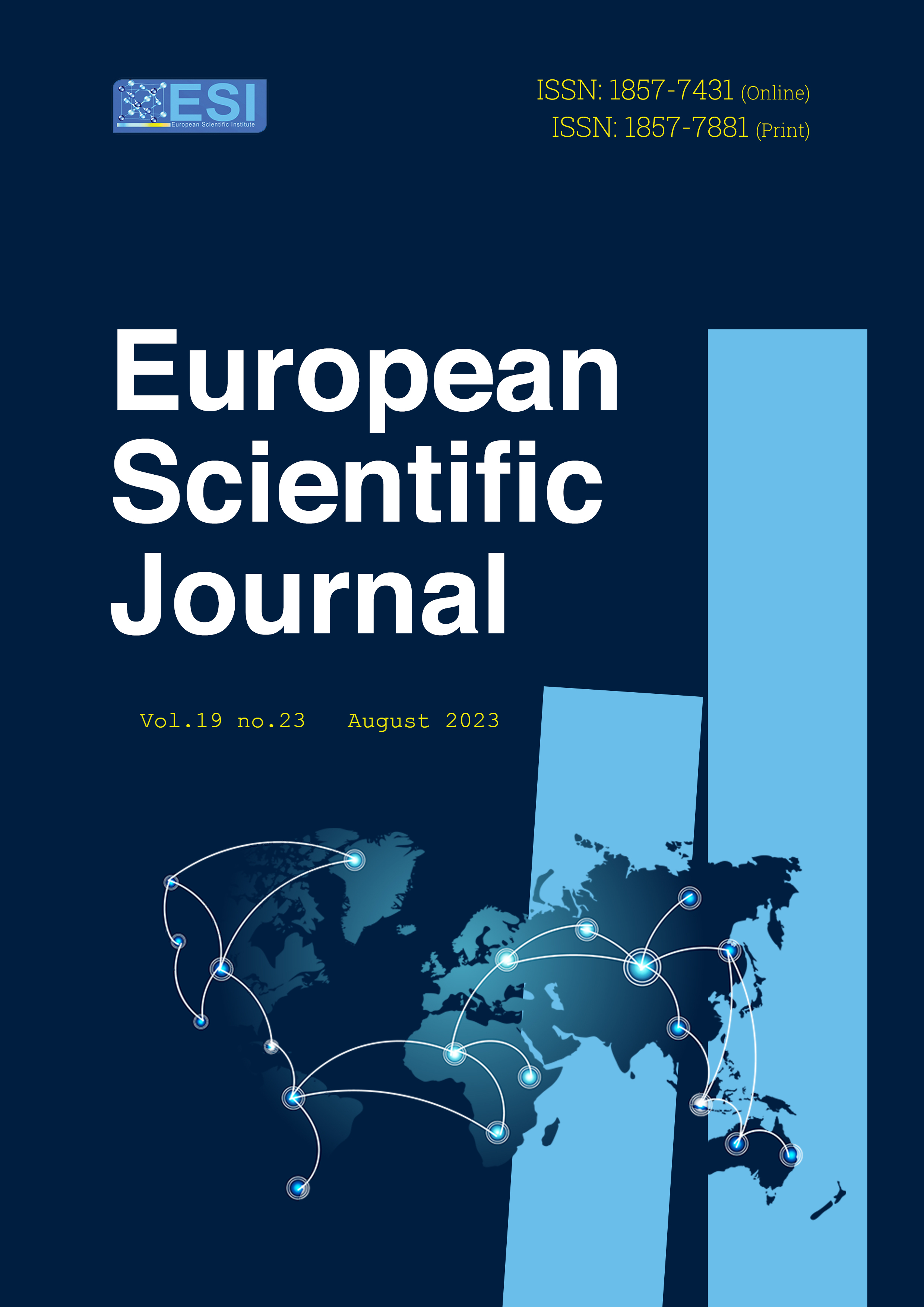Language, Religion and Culture as Tools for Peaceful Co-Existence: A Case Study of South-Western Nigeria
Abstract
Nigeria and the world at large has experienced series of conflicts which have led to killing of innocent citizens and wanton destruction of valuable properties. Despite all efforts made at proffering solutions to conflicts and violence, Nigeria is yet to achieve the intended resolution. This paper focuses on investigating the use of language, religion and culture in generating a peaceful co-existence among the people of south-western Nigeria. In this research article, it was uncovered that the intended peak of conflict resolution in Nigeria is yet unattained. The research article was based on social exclusion theory and adopted a survey research design. A structured questionnaire was used to collect data from a total of 180 respondents. Data were analyzed with the use of descriptive statistics. It is expected that the research article will help Nigerians to resolve their internal conflict through the appropriate use of language, culture and religion.
Downloads
PlumX Statistics
References
2. Abolaji, S. M. (2019). Language use in conflict resolution: Nigeria and South Africa xenophobic attack. In Journal of Issues in language and literary studies (IL and LS) of the Department of English, Faculty of Humanities, Ajayi Crowther University, Oyo, Oyo State, Nigeria. 5 (1), 170-185.
3. Adekunle, S. K. (2004). Christian religion: A means for moulding the character of Nigerian youth. In M. A. Folorunsho & I. O. Oyeneye, (Eds), Religion and community.Makanjuola Publishers.
4. Adeyemi, H. K. & Adebisi, O. (2015). Ethnic violence and national development in democratic Nigeria: A historical analysis. A Journal of the School of Arts and Social Sciences, Federal College of Education (Special), Oyo State, Nigeria. 5 (1), 49-55
5. Adeyinka, Y. (2005). Eka-ede Yoruba ninu akojopo eko ede Yoruba (Atona akekoo) ti eka Yoruba. Visual Resources Publishers.
6. Ajibade, M. I. (2019). Language and nationalism in the selected Lawuyi Ogunniran’s writings. In Journal of Issues in language and literary studies (IL and LS) of the Department of English, Faculty of Humanities, Ajayi Crowther University, Oyo, Oyo State, Nigeria. 5 (1), 118- 129
7. Anugwom, E. E. (2000). Ethnic conflict and democracy in Nigeria: The marginalization question. Journal of Social Development in Africa, 16(32), 68-78
8. Awobuluyi, O. (2010). Linguistics and nation building. Paper delivered at the Professor Ayo Bamgbose Personality Lecture. University of Ibadan, Ibadan, Oyo State, Nigeria.
9. Awolu, O. & Dopamu, A. (1993). West African traditional religion. Ibadan; Onibon-oje Press.
10. Bovin, A. E, (1979). Peaceful coexistence, in the Great Soviet Encyclopedia, (3rd ed). https://encyclopedia2.thefreedictionary.com/Peaceful+Coexistence (accessed29/10/2018)
11. Caudwel, C. (1997). Illusion and reality, London: Lawrence & Wishart.
12. Chika, A. E. (2011). Conflicts between traditional and western culture: A case study of Soyinka’s death and the king’s horseman and the lion and jewel writings. M.A. Dissertation, Department of English, University of Ilorin, Ilorin, Nigeria.
13. Durkheim, E. (1997). The division of labour in the society. Free Press.
14. Garba, U. (2007). Ethno-religious violence in Nigeria [Unpublished master thesis]. University of Ilorin. Isiramen, C. O. (2010). Religion education and the Nigeria nation. In C. Isiramen & F. Imachhai, (Eds.) Religion and the Nigerian Nation. Enjoy Press and Books.
15. Hamzat, K., Adeyemi, O & Adebisi, M. (2015). Ethnic violence and national development in democratic Nigeria: A histirical analysis. In Journal of Arts and Social Sciences Education, Federal College of Education (Special), Oyo State, Nigeria. 5(1), 267-277.
16. Isiramen, C.O. (2010). Religious Crises and Development in Nigeria: Implication for Counselling. The Journal of Counselling and Development. 1 (1) 112-119.
17. Lebron, A. (2013). ‘What is culture?’ Merit Research Journal of Education and Review, 1(6), 126- 132. Retrieved from http:www.meritresearchjournals.org/er/index.htm
18. Krejcie, R. V. & Morgan, D. W. (1970). Determining sample size from research activities. Educational psychological measurement. Ilorin: Blessed James Publication.
19. Lenoir, R. (1970). Social exclusion and children – OECD. http://www.oecd.org > school Accessed on 5-7-2022
20. Ogunṣina, B. (2006). The development of the Yoruba novel. Ilorin: Gospel Faith Mission Press.
21. Ojo, E. O. (2006). Mechanisms for conflicts management in plural and divided society: The Nigerian experience. IFRA, Ibadan, Special Research Issue, 2(1), 65-76
22. Otite, O. (1999). Community conflicts in Nigeria management resolution and transformation. Spectrum Book limited.
23. Oyetade, J. Ọ (2018). Atunpa ero lori iṣatunto: Irinṣẹ fun aabo ni awujọ Yoruba. In Yoruba Gbode, Journal of Association of Yoruba Language and Culture of Nigeria. 7 (1), 180- 194
24. Ọdunjọ, J. F. (1990). Akojọpọ ewi aladun. Longman Nigeria Ltd.
25. Salawu, B. (2010). Ethno-religious conflicts in Nigeria: Causal analysis and proposals for New management strategies. European Journal of Social Sciences, 13 (3).
26. Salahudeen, M. A. & Adeleke, A. F. (2015). Conflict of culture and its implications on Muslim students of Emmanuel Alayande College of Education. In Journal of Arts and Social Sciences Education, Federal College of Education (Special), Oyo State, Nigeria. 5(1), 225-235.
27. Sanni, H. A. (2020). Role of Yoruba literature in promoting Yoruba culture in a global community. In Journal of Human Studies, School of Arts & Social Sciences, Osun State College of Education, Ila-Orangun, 10 (1), 456-476.
28. Tempo, S. (2013). Ethnic and violence. Lagos Television Authority, July 14, 18 (2).
29. The Reason for Studying African Religion in Post-colonial Africa. www.academia.edu/44222274/
30. Yusuf, M. Alighazzali (2015). Islam and religious tolerance: The Quranic input. In Journal of Arts and Social Sciences Education, Federal College of Education (Special), Oyo State, Nigeria. 5(1), 36-40.
Copyright (c) 2023 Mufuliat Iyabode Ajibade, Comfort Bukola Komolafe-Johnson, Jimoh Atolagbe Issah

This work is licensed under a Creative Commons Attribution 4.0 International License.








